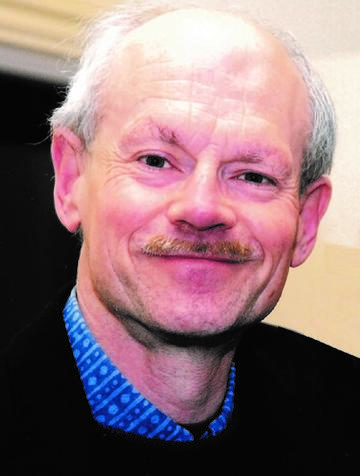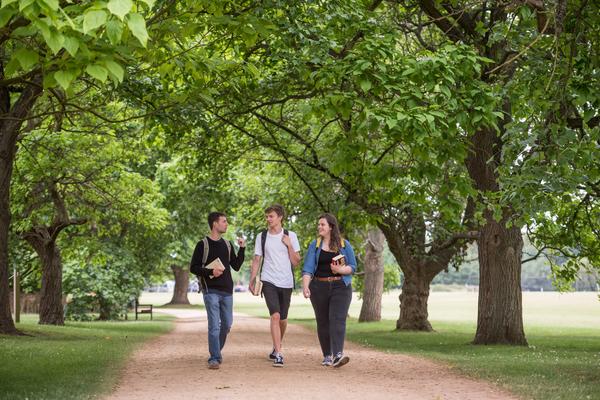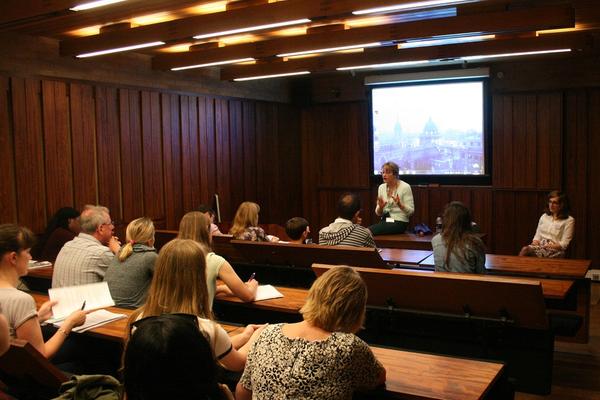Gavin Selerie
Spotlight on alumni

When I was born in 1949 the midwife nicknamed me ‘the little professor’. Was I screwing up my eyes, dazzled by light, or beginning to stare intently at a new world? Babies focus best on objects a foot or so away, which is still my mode of reading. I was educated at Haileybury and took the History entrance to Oxford, being awarded an Open Law Scholarship. Seeking a more creative direction, I switched to English at the end of my second term, which involved a lot of catching up. My tutors at Lincoln included Cicely Palser Havely for the Renaissance period, Nicholas Havely for Middle English and, in my final year, Stephen Gill for Romantic and Victorian literature.
Although the college-based tutorial system is rightly valued for close communication, the operations of the English Faculty should be recognized as equally significant. During the period 1968-1971 I attended many useful lectures. Northrop Frye on Blake was particularly inspiring; the audience spilled onto the aisle steps, packed in a way that would not be allowed under today’s health and safety regulations. Francis Warner, who lectured on Yeats, Pound, Joyce and Beckett, had something of a cult following. I particularly valued his account of the relationship between Picasso and modernist literature. John Jones, who like me had moved from the Law to Literature, delivered a series called ‘Six Anniversaries’, embracing Hegel, Beethoven, Wordsworth and Dickens. The links between different cultural spheres were fascinating. In a different way, I appreciated E.J. Dobson’s lectures on the language of The Tempest. A seemingly dry topic, covered in minute detail, came marvellously alive.
It was a heady time to be at university and Oxford, despite its traditional image, had an active countercultural scene. I saw experimental films in the basement of the Museum of Modern Art, went to the first Women’s Liberation conference at Ruskin College (featuring a young Germaine Greer), and got involved with radical politics, including an anti-racism campaign and attempts to make the university more democratically accountable. Parker’s bookshop stocked work by linguistically innovative poets, such as Barry MacSweeney, whom I’d heard read during his candidacy for the poetry professorship. Beyond the city I got to know the Oxfordshire countryside and the stamp of this is evident in poems I’ve written about Great Tew, Ditchley and the Devil’s Quoits.
I considered working for a publisher, but one company implied that my view of the trade was too idealistic. Another publisher suggested I would have to hawk books around Africa for five years to prove my worth. Involvement with an artistic network rooted in Britain and North America rendered this awkward. Instead, postgraduate work at University of York confirmed me in the path I took as a writer and lecturer in adult education. Over a period of thirty years teaching at various universities and colleges, I tried to encourage differences of approach, so that a given text could be seen from a variety of viewpoints. Perhaps my early legal training contributed to this. A course I taught on song lyrics from the Border Ballads through Wyatt and Byron to Dylan and Joni Mitchell aroused much interest. I have stayed in touch with some students. Several went on to become prominent journalists and one became a leading music producer. Meanwhile, as a writer, I learned to combine structural innovation with directness of expression. Ian McMillan of The Verb (Radio 3) has described this work as ‘restlessly experimental’, while also praising ‘accuracy’ in description of place and ‘tender lyric[ism]’ in the portrayal of relationships. In recognition of such qualities I have received support from the Arts Council for three projects.
What I’ve carried with me, in particular, from Oxford is a spirit of inquiry that involves much probing and the patience to find new angles. A storehouse of ideas helped to shape future work. At Birkbeck, University of London, I was called upon to teach literature from the medieval period to the present, with occasional forays back to Classical verse in translation. Similarly, my own writing draws on a broad range of historical and cultural resources. Early modern Oxford and the exploration of the New World by Thomas Harriot, Ralegh and others, is evoked in my book Hariot Double (2016). Le Fanu’s Ghost (2006) is an account of interrelated families and a journey through Irish history. A critic, approving the method, has described Azimuth (1984) as having ‘a centre in a dozen different places.’
——
Gavin Selerie has published many books and critical essays, including Music’s Duel: Selected Poems and Collected Sonnets. An in-depth interview, Into the Labyrinth, is available for download online. He is currently writing a sequence on the pandemic and a memoir of America, 1968. His literary papers, including journals from the undergraduate period, will be preserved at Lincoln College Archives.






